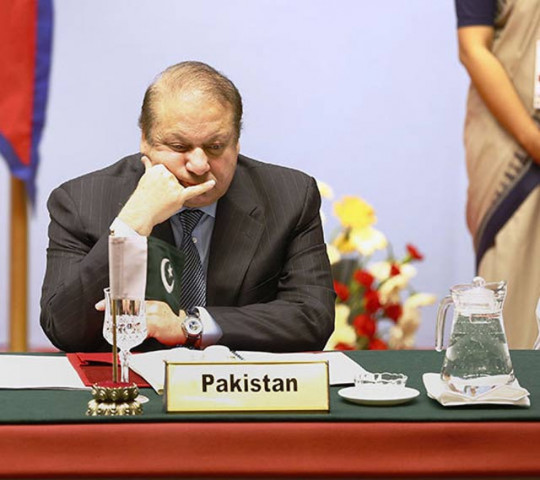What good is SAARC, really
Refusal of four finance ministers to attend conference a reality check for the association

Refusal of four finance ministers to attend conference a reality check for the association. PHOTO: AFP
India, Afghanistan, Bangladesh and the Maldives did not send their finance ministers and were represented by either deputy ministers or bureaucrats.
The problem with SAARC
The reasons for avoiding an economic conference are purely political and Pakistan alone cannot be held responsible for deteriorating relations among eight member countries. But Islamabad has to take its share of responsibility in addition to bringing its own house in order.
Afghanistan, Bangladesh, Bhutan, India, Maldives, Nepal, Pakistan and Sri Lanka are permanent members of Saarc, set up in 1985. Australia, China, the European Union, Iran, Japan, Mauritius, Myanmar, South Korea and the United States are nine observers of the organisation.
One of the main objectives of Saarc – that hosts about one-fifth of global population – is promotion of the welfare of the people in South Asia and improvement in their quality of life.
However, after 30 years of its existence, there are now more questions about the future of the body than ever before.
Trust issues
The decision not to send officials to attend the meeting of Saarc finance ministers once again highlights the issue of deepening mistrust. India’s economic affairs secretary attended the moot. “India’s (finance minister’s) absence hardly matters,” said Finance Minister Ishaq Dar while trying to play down the absence. His statement showed his frustration, as one of the core objectives of the PML-N foreign policy was improving relations with India.
Pakistan, India rivalry threatens to overshadow SAARC forum
The relations have not soured overnight, as there is a long history of enmity. India and Pakistan are not at ease over the issue of unrest in Indian Kashmir and Balochistan. Pakistan and Afghanistan have their own problems. Relations between Pakistan and Bangladesh are at the lowest ebb in decades.
“India is trying to take advantage of Pakistan’s uneasy relations with its neighbours, it is playing a spoiler’s role and tarnishing Pakistan’s image in the Muslim world,” says Zubair Ahmad Malik, member of the advisory council of Saarc Chamber of Commerce and Industry. Malik also blames the government for its foreign policy failures.
China-India
The competition between China and India is another factor, putting a question mark over the fate of the moribund Saarc.
India has divided the club of eight countries and entered quadrilateral agreements where Pakistan blocked approval of such agreements by Saarc.
After Pakistan’s refusal to sign the Motor Vehicle Agreement (MVA) during the last Saarc summit, Bangladesh, Bhutan, India and Nepal signed the MVA, known as BBIN. Bangladesh will conduct a trial run of cargo vehicle from Dhaka to Delhi on August 30 under the BBIN. India is trying to get access to Afghanistan through land route, which Pakistan is not ready to give due to its apprehensions.
Bangladesh, Bhutan, India and Nepal are also in discussions on the possibility of having a BBIN Rail Agreement drawing on the draft Saarc Regional Rail Agreement template.
The message for Pakistan is clear that if it is not a willing partner it will be left out. In such circumstances, there are bleak chances that all the heads of states and governments would attend the 19th Saarc Summit that Pakistan is holding this year on November 9-10 in Islamabad.
While meeting with Saarc delegates a couple of months ago, Afghanistan President Ashraf Ghani reportedly said that Saarc won’t be alive after two years, if things did not change.
The organisation is not even given a proper speaking forum due to poor attendance of the members, says Lieutenant General retired Talat Masood — a defense analyst. General Masood says both India and Pakistan have to sit together to sort out their issues, if they want to keep the Saarc somehow relevant in the future.
On Pakistan’s part, the civilian government needs to take full ownership of foreign policy and for that it has to address some genuine concerns of the security establishment, according to other experts.
Nawaz drops Modi another invitation for upcoming SAARC summit
The regional countries should make the Saarc Secretariat vibrant, which currently does not even have funding to run its operations. The Asian Development Bank is financing some of studies that are critical for Saarc’s future.
There are little chances that both countries would make efforts to address these issues due to deep-rooted mistrust that shows no signs of getting resolved.
The writer is a staff correspondent
Published in The Express Tribune, August 29th, 2016.
Like Business on Facebook, follow @TribuneBiz on Twitter to stay informed and join in the conversation.



















COMMENTS
Comments are moderated and generally will be posted if they are on-topic and not abusive.
For more information, please see our Comments FAQ